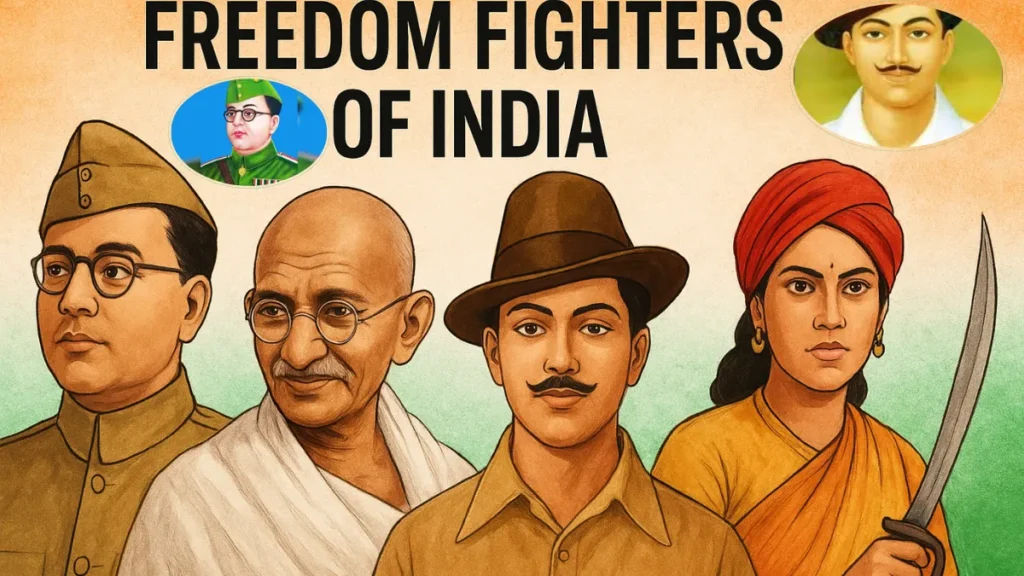The story of India’s freedom is written with the sacrifices, struggles, and unshakable determination of countless brave souls. Freedom Fighters of India were not just leaders or revolutionaries; they were visionaries who dreamed of a free nation and gave everything sometimes even their lives for that dream. Their journey was filled with courage, resilience, and unity against one of the most powerful colonial empires in history.
In this article, we’ll explore the lives and contributions of the most prominent freedom fighters of India, understand their impact, and see why their legacy still inspires generations.
Why Freedom Fighters of India Are Remembered as National Heroes
The freedom fighters of India are remembered not only for achieving independence from British rule but also for sowing the seeds of equality, justice, and unity. They taught the nation the importance of self-respect, self-reliance, and brotherhood. Their struggles continue to remind us that freedom is priceless and must always be protected.
Early Freedom Fighters of India
Before the great movements of the 20th century, India had already seen remarkable warriors and leaders rise against British and foreign powers.
- Mangal Pandey (1827–1857) – The soldier who sparked the Revolt of 1857, often called the first war of independence.
- Rani Lakshmibai of Jhansi (1828–1858) – The warrior queen who fought bravely against the British during the 1857 uprising.
- Begum Hazrat Mahal (1820–1879) – A courageous leader who played a crucial role in the revolt against colonial rule.
These early heroes ignited the fire of resistance that would later grow into a nationwide movement.
Major Freedom Fighters of India in the 20th Century
Mahatma Gandhi The Father of the Nation
Mahatma Gandhi pioneered the path of non-violence (Ahimsa) and civil disobedience. Movements like the Dandi March, Quit India Movement, and Non-Cooperation Movement united millions of Indians peacefully against British rule. Gandhi’s philosophy inspired not only India but also global civil rights movements.
Subhas Chandra Bose Netaji and the Indian National Army
Subhas Chandra Bose believed in armed resistance and founded the Indian National Army (INA). His slogan “Give me blood, and I will give you freedom” remains one of the most powerful war cries in India’s history.
Bhagat Singh The Symbol of Youthful Revolution
Bhagat Singh, along with Rajguru and Sukhdev, gave his life at a very young age. His fearless acts and sacrifice made him an icon of courage and patriotism.
Sardar Vallabhbhai Patel The Iron Man of India
Known for his leadership in uniting princely states, Patel was instrumental in shaping modern India. He also played a key role in the Quit India Movement.
Jawaharlal Nehru The First Prime Minister of India
Nehru, a close associate of Gandhi, envisioned a free and modern India. His speeches and leadership in the freedom struggle gave the people hope and direction.
Other Influential Freedom Fighters
- Bal Gangadhar Tilak – “Swaraj is my birthright and I shall have it.”
- Annie Besant – A social reformer and strong supporter of Home Rule.
- Lala Lajpat Rai – Known as the “Punjab Kesari,” he gave his life in protests against British policies.
- Chandrashekhar Azad – A fearless revolutionary who pledged never to be captured alive.
Strategies Used by Freedom Fighters of India
- Non-violent Movements – Gandhi’s peaceful protests and satyagraha.
- Revolutionary Actions – Youth-led uprisings and armed resistance.
- Social Reforms – Education, equality, and women’s rights campaigns.
- International Support – Leaders like Bose sought help from abroad to weaken British control.
Legacy of Freedom Fighters of India
The sacrifices of these heroes gave India its independence in 1947. But their legacy goes beyond freedom. They left behind:
- A vision of unity among diversity.
- The idea of self-reliance and dignity.
- Inspiration for future generations to fight against injustice.
Even today, their stories are taught in schools, celebrated in films, and honored during national festivals like Independence Day (15 August) and Republic Day (26 January).
Conclusion
The freedom fighters of India are the eternal torchbearers of courage, unity, and sacrifice. Their struggles shaped the destiny of a nation and ensured that generations after them could breathe freely. Remembering them is not just an act of respect but also a way to learn how determination, resilience, and unity can overcome even the greatest challenges.
Follow our page hindibiography.in for such informative articles
FAQs on Freedom Fighters of India
Why should we remember freedom fighters today?
Because their courage and sacrifices remind us of the value of freedom and inspire us to protect justice and democracy.
How did India finally achieve independence?
Through decades of combined efforts—mass movements, revolutionary struggles, negotiations, and global political changes—India finally gained independence on 15 August 1947.
What methods did freedom fighters use?
They used both non-violent methods (like protests and boycotts) and revolutionary actions (like armed resistance).
एसे ही इंफोरमटिक आर्टिकल के लिए हमारे इस पेज को फॉलो करे
